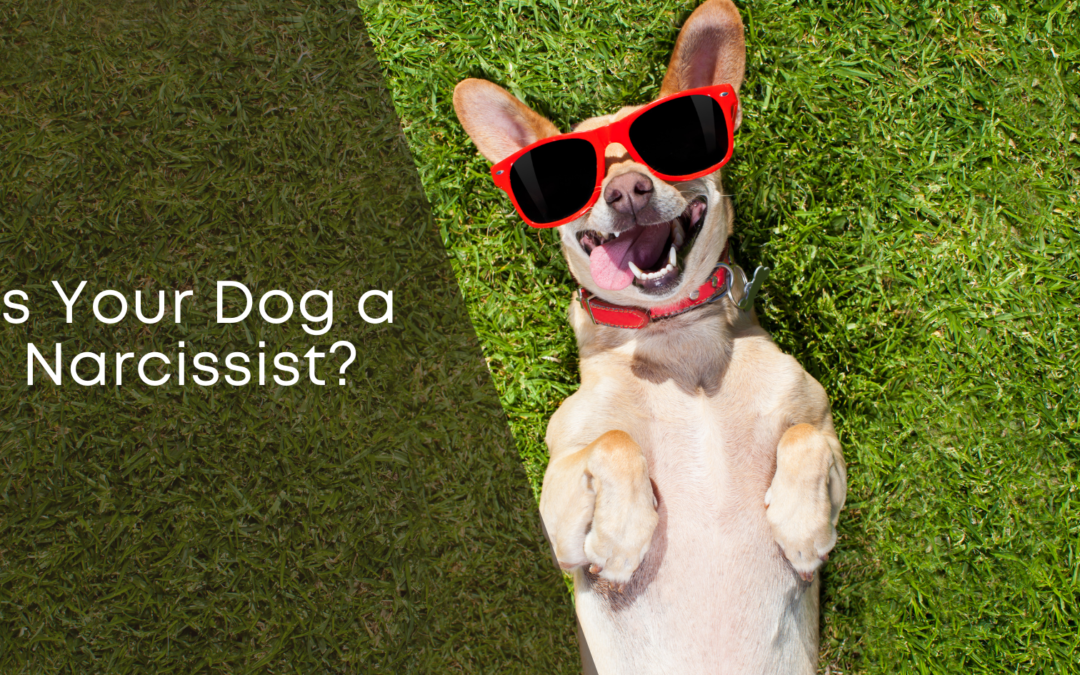Ever felt like your furry friend has a larger-than-life personality? While dogs are known for their loyalty and affection, some pups exhibit behaviors that seem strangely familiar – almost like they’ve taken a page out of the human narcissist’s playbook. Instead of the usual wagging tails and enthusiastic barks, you might find yourself facing a cold shoulder and a disdainful look. Could it be? Is your beloved dog… a narcissist?
In this blog, we’ll explore the surprising parallels between human narcissism and the behaviors exhibited by some dogs.
The Problem
While it may sound like something out of a sitcom, many pet owners have encountered behaviors in their dogs that bear an uncanny resemblance to human narcissism. From demanding attention to displaying a lack of empathy, these behaviors can leave us scratching our heads. While these behaviors can often go unnoticed in our pets, they can be incredibly difficult in human relationships. It is important to be aware of narcissistic qualities in those around you. If your dog or someone around you is displaying these qualities, it is possible that they are a narcissist.
5 Qualities of a (Canine) Narcissist
As a divorce mediator with over 30 years of experience, I’ve seen my fair share of complex personalities – both human and canine. But fear not, because I’m here to lend a helping paw and shed some light on the quirky world of canine narcissism.
1. Demanding Attention
Just like their human counterparts, narcissistic dogs exhibit an insatiable need for constant attention and validation. They’ll assert themselves at the forefront, demanding cuddles and treats as if entitled to them, leaving you questioning who truly holds the reins in the relationship dynamic. This characteristic strikingly reflects the behavior of narcissistic individuals in human relationships. Just as narcissistic dogs seek validation and attention to bolster their inflated sense of self-importance, narcissistic humans relentlessly pursue admiration and affirmation from others to sustain their fragile egos. In both cases, the quest for validation becomes a driving force, dictating their interactions and relationships with others.
2. Lack of Empathy
While dogs are known for their empathy, narcissistic pups may seem more interested in themselves than in your feelings. They’ll happily steal your spot on the couch without a second thought – talk about ruff! This behavior can be startlingly similar to the lack of empathy displayed by narcissistic individuals in human relationships. Just as narcissistic dogs prioritize their own needs and desires over those of others, narcissistic humans often struggle to empathize with the emotions and experiences of those around them. Instead, they focus solely on their own wants and interests, disregarding the feelings of others in the process. It’s a stark reminder that narcissistic tendencies can manifest in both our beloved pets and ourselves, albeit in different ways.
3. Sense of Entitlement
Ever felt like your dog expects the world to revolve around them? That’s because narcissistic dogs have a sense of entitlement, demanding treats and belly rubs as if they’re their divine right. This behavior mirrors the entitlement often observed in narcissistic individuals in human relationships. Just as narcissistic dogs act as if they deserve special treatment simply because they exist, narcissistic humans believe they are entitled to preferential treatment and attention from others. Whether it’s expecting lavish praise or insisting on having their needs met immediately, both narcissistic dogs and humans share a belief that they are inherently deserving of special treatment.
4. Manipulative Behavior
From puppy eyes to guilt-tripping whimpers, narcissistic dogs are masters of manipulation. They’ll use every trick in the book to get what they want, leaving you powerless to resist. This cunning behavior mirrors the manipulative tactics often employed by narcissistic individuals in human relationships. Just as narcissistic dogs leverage their charm and cuteness to bend you to their will, narcissistic humans utilize emotional manipulation and subtle coercion to achieve their selfish objectives. Whether it’s playing on your sympathies or exploiting your vulnerabilities, both narcissistic dogs and humans are adept at manipulating others to serve their own interests.
5. Inability to Accept Criticism
Try telling a narcissistic dog they’re being a little too… well, narcissistic, and you’ll be met with a blank stare or a dismissive tail wag. They’re simply too fabulous to accept criticism – or so they think. This resistance to criticism mirrors the behavior of narcissistic individuals in human relationships. Just as narcissistic dogs brush off any attempt at constructive feedback, narcissistic humans often react defensively or dismissively when confronted with criticism. They believe themselves to be flawless and above reproach, refusing to acknowledge any flaws or shortcomings. It’s a classic trait of narcissism, whether exhibited by our furry friends or ourselves.
My Dog Might Be A Narcissist. What’s Next?
If you suspect that someone in your life – whether human or canine – may be exhibiting narcissistic tendencies, don’t hesitate to seek support. As a seasoned divorce mediator with over 30 years of experience, I’ve helped countless individuals navigate complex relationships and find solutions to challenging situations.
Reach out today to learn more about how I can assist you in addressing narcissistic behaviors and fostering healthier connections with those you care about. Together, we can create a brighter, more fulfilling future for you and your furry friend.


Recent Comments